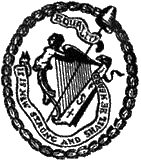
|
|
Penal Laws
For most of the 17th century the continuing political influence
of Irish Catholics, and the desire of successive monarchs to retain a free
hand, had been sufficient to block attempts to pass anti-Catholic legislation
similar to that in operation in England. Periodic repression of Catholic
worship, and the increasing exclusion of Catholics from political and
administrative office, had been implemented on an ad hoc basis (or, in the case
of the Cromwellian regime, by the de facto application in Ireland of English
law). The enactment from the 1690s of a series of discriminatory measures
directed against Catholic clergy and laity reflected the hardening of Irish
Protestant attitudes following their experiences under James II, the enhanced
importance of the Irish parliament as a forum for their demands, and the new
primacy, following the revolution of 1688, of statute over prerogative.
The first Irish penal laws were two statutes in 1695, both part
of the bargain that ended the sole right controversy, and both reflecting
Protestant fears that lenient treatment of the defeated Jacobites had left
Protestants dangerously open to renewed attack. One forbade Catholics not
covered by the treaty of Limerick to keep weapons. The second, concerned mainly
to sever links between Irish Catholics and their continental allies, forbade
Catholics to go overseas for purposes of education, but also banned Catholics
from teaching or running schools within Ireland. The Bishops' Banishment Act
(1697) required all regular clergy, and all bishops, vicars-general, and others
exercising ecclesiastical jurisdiction, to leave the kingdom by 1 May 1698.
Other clergy were permitted to remain, but an act of 1704 required them to
register with the authorities, limited their number to one per parish, and
forbade the entry of further priests into the kingdom. The Act to Prevent the
Further Growth of Popery (1704), the most important single penal statute,
prohibited Catholics from buying land, inheriting land from Protestants, or
taking leases for a period of longer than 31 years. (Protestant heiresses
marrying Catholics had already been disinherited under an act of 1699.) The act
also required that the estates of a deceased Catholic landowner should be
divided equally among the male heirs. An act of 1709 strengthened these
provisions, particularly by the introduction of the discoverer. Other
legislation prohibited Catholics from practising law, from holding office in
central or local government, membership of grand juries and municipal
corporations, and from service in the army or navy. Catholics were excluded
from parliament (under an English act) from 1691, but did not completely lose
the right to vote until 1728.
The penal laws were traditionally seen as victimizing the entire
Catholic population. More recent work emphasizes the selective nature of their
operation. The Catholic aristocracy and gentry, who in 1703 still owned 14 per
cent of the profitable land of Ireland, were both the main targets of the
legislation and its main victims. Over the next few decades most of these
surviving Catholic landowners, deprived of the opportunity to extend their
estates by marriage or purchase, excluded from local and national politics, and
threatened with the progressive fragmentation of their properties, conformed to
the Church of Ireland. By contrast the laws did not seriously affect the wealth
of the Catholic mercantile and manufacturing classes. Catholic tenants suffered
some disadvantage, but the laws did not prevent the emergence during the 18th
century of a Catholic leasehold interest among large farmers and middlemen, or
the growth of a Catholic tenant farmer class. Strictly enforced, the banishment
of Catholic bishops, combined with the ban on ordained priests entering the
kingdom, should have caused the Irish clergy to die out in a generation. In
practice, despite the efforts of individuals like John Richardson, there was no
sustained attempt either to enforce the laws or to promote the conversion of
the Catholic masses to Protestantism. By the 1720s priests and bishops operated
freely, if discreetly, in most areas.
Agitation for the repeal of the penal laws, commenced with the
foundation of the Catholic Committee in 1760. Catholic Relief Acts were passed
in 1778, 1782, and 1792-3, with the remaining formal disabilities being
repealed, ('Catholic emancipation') in 1829.
Power, T. P., and Whelan, Kevin (eds.), Endurance and Emergence:
Catholics in Ireland in the Eighteenth Century (1990).
The above article was extracted from page 438 of the Oxford
Companion to Irish History (1998) which was edited by S J Connolly.
View 1704 Act |
